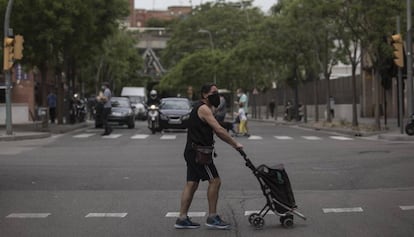Despite moving to Phase 1 of deescalation, residents of Barcelona confined to city
The choice by the Catalan regional government to designate the area as a healthcare zone means that inhabitants are now alone in Spain in being limited to such an urban area

From Monday, Barcelona became the only city in Spain whose inhabitants are unable to leave, apart from if they have to go to work, and despite the Catalan capital having entered Phase 1 of the government’s coronavirus deescalation plan. The reason is down to the regional authorities opting to consider Barcelona as a single healthcare zone, meaning that its residents are now effectively penned in, despite the fact that the metropolitan area of Barcelona constitutes a mesh of 40 municipalities, in which two out of every three Catalans live.
The Spanish government initially suggested that Spain’s provinces should serve as the geographical zones for the deescalation plan, which is broken down into four phases, running from 0 to 3, and which are being implemented asymmetrically depending on the conditions in each area. However, some regional governments – including Catalonia – pushed to divide up their territories by healthcare areas, given that hospital and primary care capacity are key factors taken into account when the government authorizes moving from one phase to another.
Inhabitants of neighboring cities cannot enter Barcelona either, as they normally would on a daily basis
The choice to use healthcare areas by the regional government currently means that Barcelona residents cannot leave the city limits, while inhabitants of neighboring cities cannot enter either, as they normally would on a daily basis.
For example, an inhabitant of L’Hospitalet, the second-most populous city in Catalonia, cannot cross Riera Blanca street that borders Barcelona if they want to go shopping, but they can, however, drive more than 50 kilometers in their vehicle to Vilafranca del Penedès.
“This is all completely absurd to me and shows that the regional government doesn’t understand the social and economic reality of the metropolitan area, it’s something that is alien to them,” complains Núria Marín, the mayor of L’Hospitalet and the president of the Barcelona provincial authority. “Who will ensure that this criteria is observed?” she asks, adding that she would not give orders to the local police to enforce it.
Jaime Ventura, a retiree aged 76, says that what is happening is “completely incongruent, absurd,” and explains his case. He lives on Mas street in L’Hospitalet, and parks his vehicle in a parking lot 20 meters away, but in Barcelona. In the same building is a pharmacy and a bakery, which he has continued to frequent during the lockdown. “It’s more reasonable to cross the street than to walk 600 meters to go to another bakery without leaving my municipality of L’Hospitalet,” he explains. “The police have never stopped me, but if they do I am very clear that what I am doing is just pure logic.”
In a letter, local mayors point out that under Phase 1 residents of Madrid can now move freely throughout their city and province
Mayor Marín criticizes the regional government for not consulting with the affected local councils when making its requests for the phase change, and is a signatory of a letter from 30 metropolitan areas run by the Catalan Socialist Party (PSC) and sent to regional premier Quim Torra. The missive calls on Torra to unify mobility in the three affected healthcare areas: Barcelona city, the northern metropolitan area and the southern metropolitan area. “I hope that they do a U-turn,” says Marín.
In their letter, the mayors point out that under Phase 1 residents of Madrid can now move freely throughout their city and province, despite having “epidemiological rates that are more divergent between different areas of their territory than we currently have.”
The mayor of Barcelona, Ada Colau, has come out in favor of the requests of the PSC mayors. “We believe that our economic and social area is the metropolitan area,” Alfonso L. Congostrina reports her as saying. “We want to work from consensus and from the [regional] health department they asked us to evaluate the unification of the healthcare areas. We believe that this union should take place by next Monday at the latest. We need to normalize this situation. When we travel on the Metro or in other public transport we end up moving from one municipality to another without realizing it, it doesn’t make sense.”
English version by Simon Hunter.
Tu suscripción se está usando en otro dispositivo
¿Quieres añadir otro usuario a tu suscripción?
Si continúas leyendo en este dispositivo, no se podrá leer en el otro.
FlechaTu suscripción se está usando en otro dispositivo y solo puedes acceder a EL PAÍS desde un dispositivo a la vez.
Si quieres compartir tu cuenta, cambia tu suscripción a la modalidad Premium, así podrás añadir otro usuario. Cada uno accederá con su propia cuenta de email, lo que os permitirá personalizar vuestra experiencia en EL PAÍS.
¿Tienes una suscripción de empresa? Accede aquí para contratar más cuentas.
En el caso de no saber quién está usando tu cuenta, te recomendamos cambiar tu contraseña aquí.
Si decides continuar compartiendo tu cuenta, este mensaje se mostrará en tu dispositivo y en el de la otra persona que está usando tu cuenta de forma indefinida, afectando a tu experiencia de lectura. Puedes consultar aquí los términos y condiciones de la suscripción digital.








































